Open Program 2024
Theme 2024 SHARING
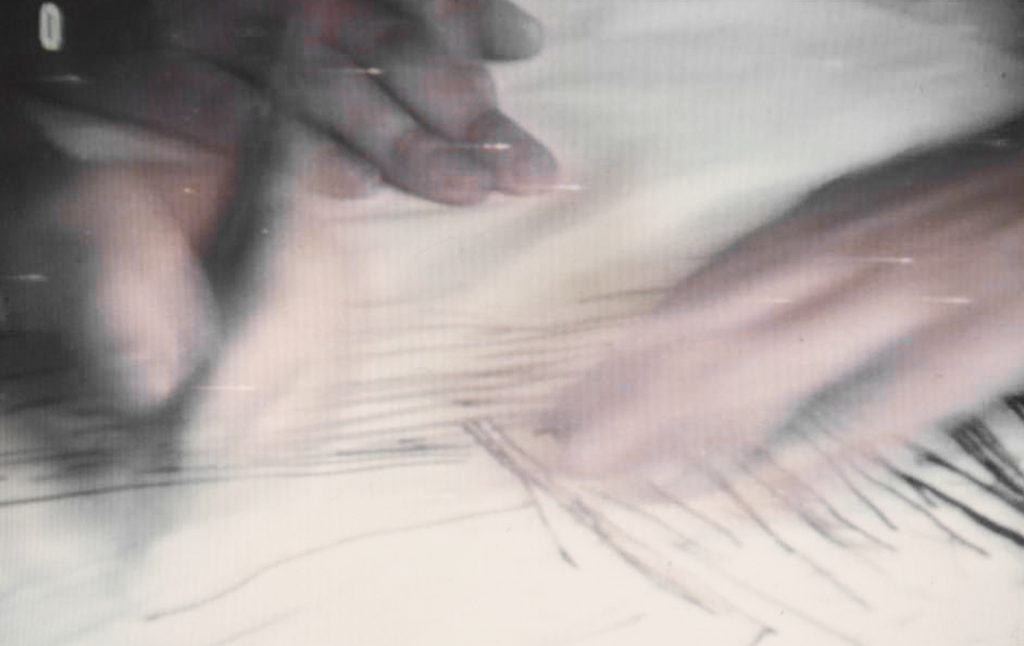
Sharing is a concept of generosity, solidarity, empathy, and respect. It implies breaking with selfishness and recognising the value of others. It is a way of living and relating to others, based on giving and receiving, to enrich oneself and contribute to the common good.
This notion gives rise to shared creativity, which refers to relational processes in all senses. Integrating different fields of knowledge makes it possible to tackle complex problems from an interdisciplinary perspective with a holistic vision of the whole creative process. Projects result from a creative dialogue in the jazz style, in which “Me” is exchanged for “Us”.
Teamwork can generate innovative and valuable solutions involving participation, exchange of ideas, cooperation, and mutual learning among group members.
Sharing makes it possible to take advantage of the strengths, knowledge, and experiences of each team member; encourages critical thinking, flexibility, originality, and divergence; stimulates motivation, commitment, trust, and personal and group satisfaction; facilitates adaptation to change, conflict resolution and continuous improvement, and generates projects, products or services of higher quality, competitiveness, and social relevance.
Lecture Series RCR TALKS
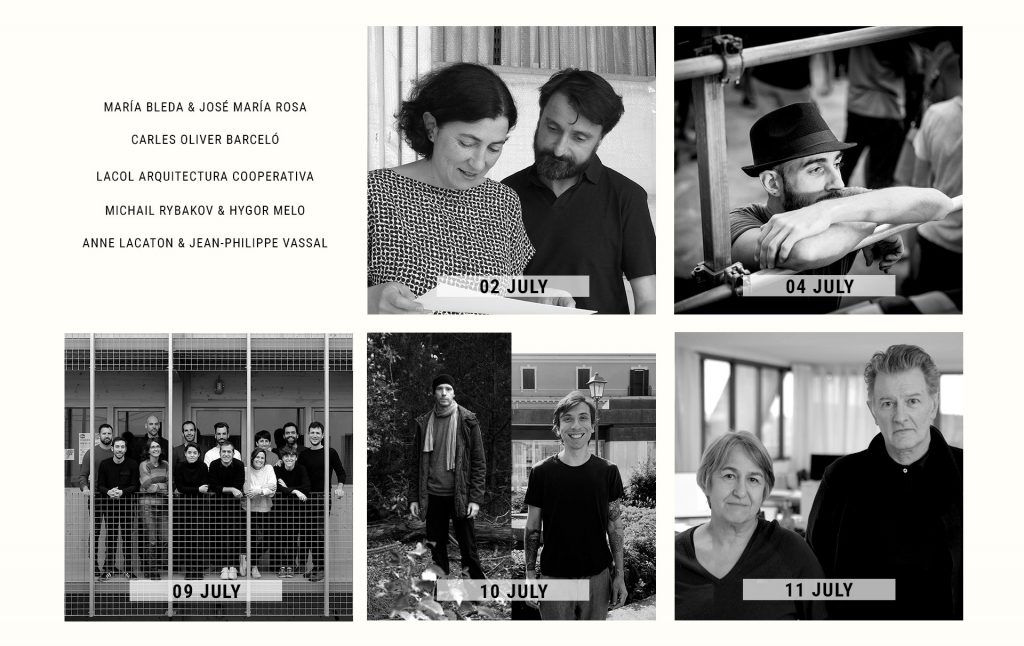
The series of five lectures is in charge of the photographers María Bleda and José María Rosa, National Photography Award 2008; the Balearic architect Carles Oliver Barceló, who directed the “Life Reusing Posidonia” climate change adaptation project in Formentera, which received the LIFE 2021 award for the best environmental project by the European Commission; Cristina Gamboa de Lacol, the cooperative of architects in Barcelona that works to generate community infrastructures for the sustainability of life, as a key tool for the ecosocial transition; multimedia artist-in-residence Michail Rybakov with researcher specialized in computational physics and complex systems Hygor Melo from Sony Computer Science Laboratories in Rome (Sony CSL) with a conference in dialogue under the umbrella of the European project S+T+ARTS Air: Artistic Innovation for European Resilience; and Anne Lacaton and Jean-Philippe Vassal of the French architectural firm Lacaton & Vassal and the 2021 Pritzker Prize.
FOREST MATTER VI
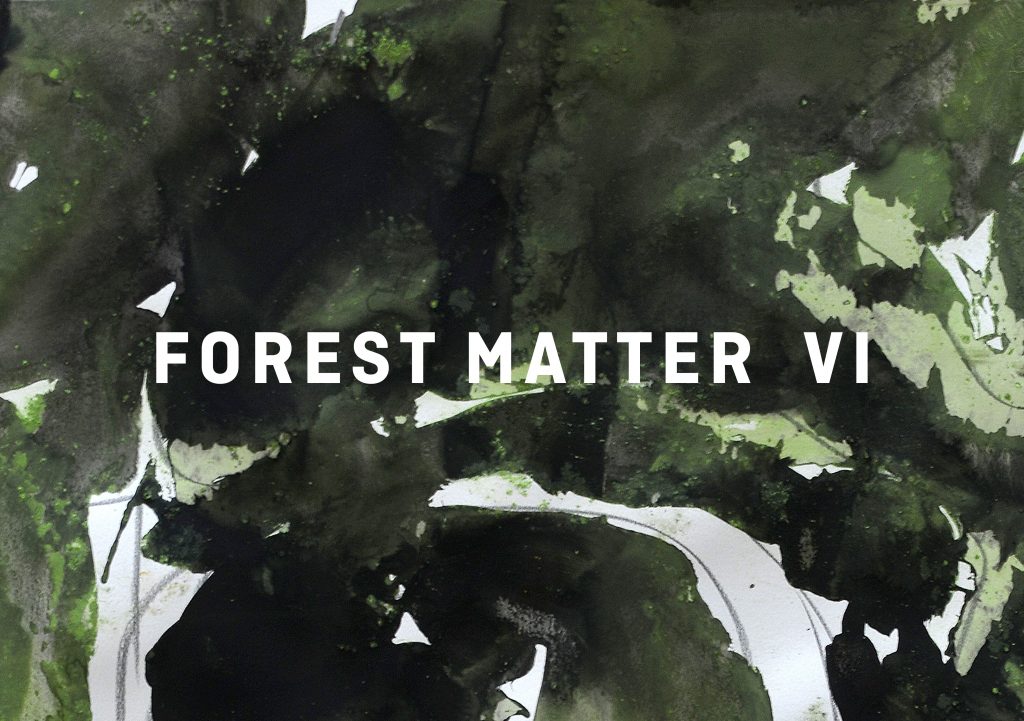
Forest Matter is a program of the RCR Bunka Foundation curated by Isabel Ferreira and made in collaboration with LABEA, the Laboratory of Art, Science, and Nature.
It features a collection of short video dances, video performances, and video artworks that, like in previous editions, open the Open Program conferences and celebrate the poetic power of trees.
Isabel Ferreira is a curator and cultural manager. She is currently the artistic director of LABEA and Arbola, the festival that celebrates the culture of trees. She has a degree in Art History and a master’s degree in Visual Culture and is a university expert in Culture and Territory.
Video-creation Series FOREST MATTER VI
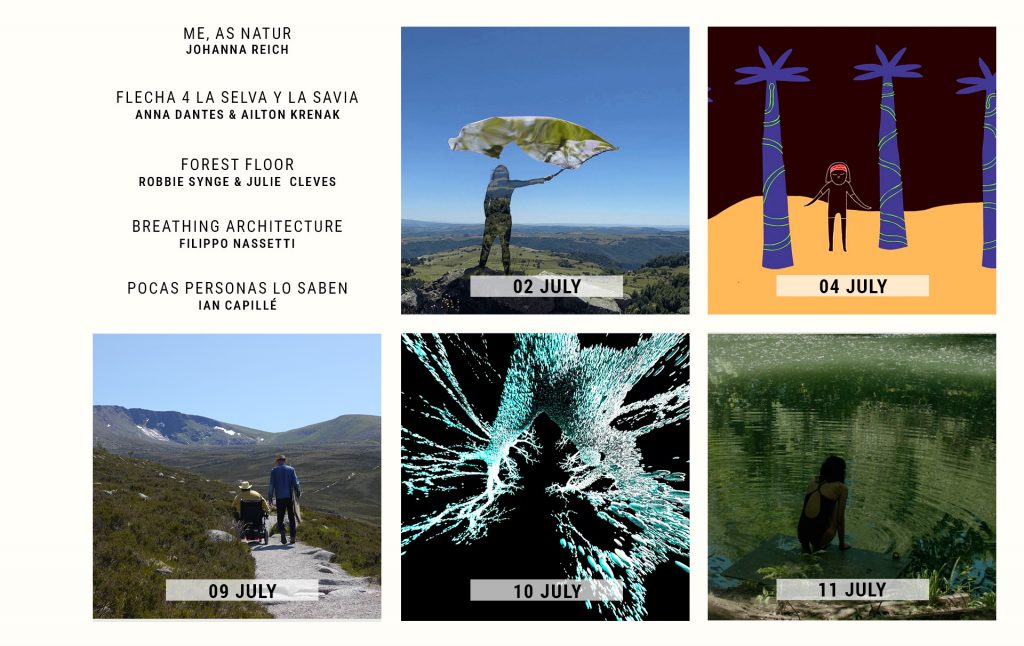
“We begin to produce forest as subjectivity, as a poetics of life.”
Ailton Krenak
Forest Matter celebrates the sixth edition in 2024 with a program of five video creations that dialogue with the five lectures under the common theme of Sharing.
German artist Johanna Reich’s exploration of our relationship with nature sets the stage for Bleda and Rosa‘s contemplation of the strata of a different place. The Brazilians Anna Dantes and Ailton Krenak delve into the cosmic reality of life before embarking on a journey with Carles Oliver to propose a potential productive model to combat climate change. The British Robbie Synge and Julie Cleves‘ collaborative solutions to enhance access to nature for people with physical disabilities pave the way for the proposals developed by Lacol around community infrastructures. Italian architect Filippo Nassetti and multimedia artist Michail Rybakov, both artists-in-residence of the S+T+ARTS AIR program, push the boundaries of art and science with their collaborative experiments using model scientists, numerical simulations, and visualization techniques generated with High-Performance Computing. This groundbreaking research model is presented in a dialogue with Hygor Melo from the Sony Computer Science Laboratories in Rome. The cycle concludes with Ian Capillé, who reimagines the tree as a camera, a support for images, and works in tandem with the French architects Anne Lacaton and Jean-Philippe Vassal, who believe that architecture is freedom, generosity, and pleasure. Ian Capillé‘s work has been produced during the Arbola 2024 Residencies in the creation category, supported by LABEA and RCR Bunka Foundation.
Tuesday, July 2, 2024 · Forest Matter VI · Pati de l'Hospici · Olot · 19h
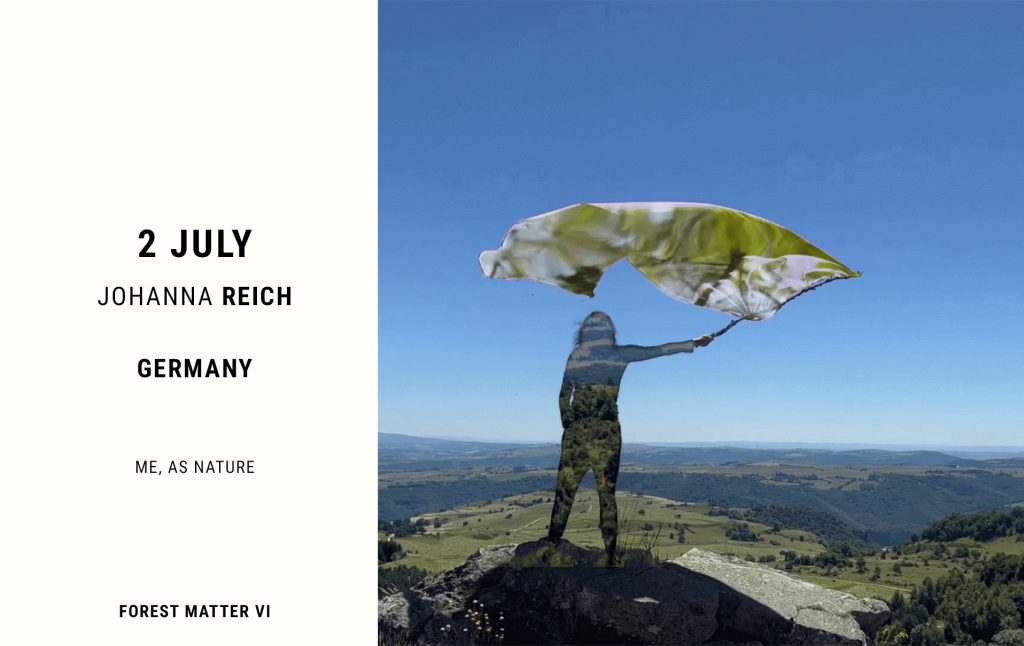
FOREST MATTER VI · Me as Nature (2023) · Johanna Reich, Germany · 01:27 min
The video performance “Me as Nature” presents the artist standing in front of the mountainous landscape, a silhouette of nature. In her hands, she waves a flag that seems to be made of sparkling water. This performance serves as a poignant reminder of the centuries-long human endeavor to dominate nature through technology, a separation that we are now beginning to question. The development of artificial intelligence prompts us to re-evaluate our relationship with nature and, more importantly, with ourselves.
Visual artist, filmmaker: Johanna Reich.
Tuesday, July 2, 2024 · Lecture · Pati de l'Hospici · Olot · 19h
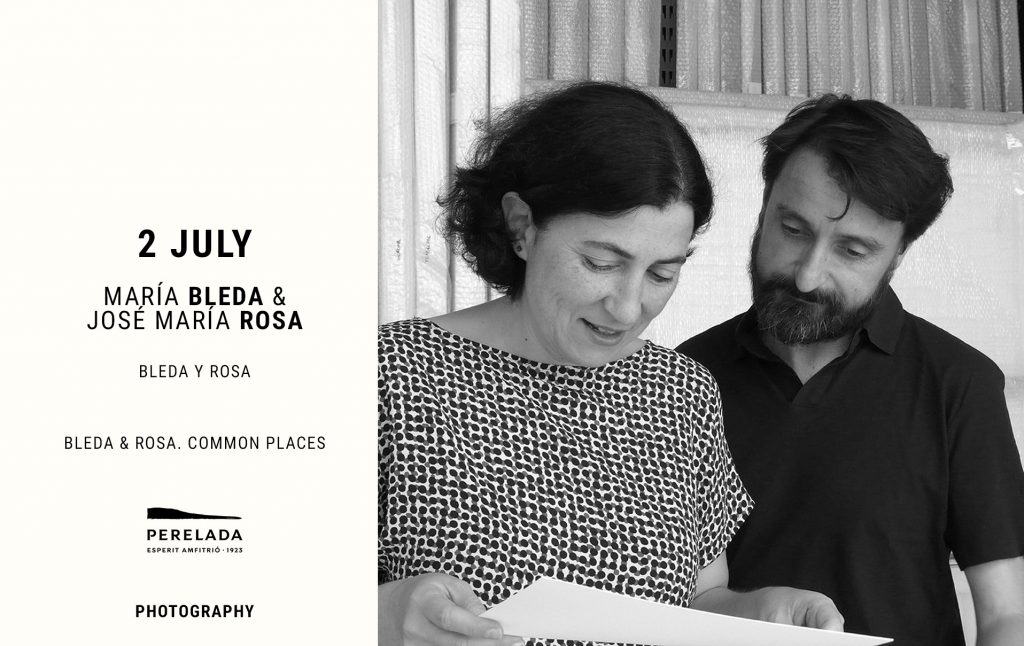
PHOTOGRAPHY · Bleda and Rosa. Common Places · María Bleda and José María Rosa · Bleda y Rosa
Presented by Ricard Planas, art critic, editor and cultural manager
This conference is supported by Perelada Vins i Caves.
Our perception of the territory has always been rooted in the belief that it is a shared resource, a vessel of collective memory. Through our photographs, we strive to unearth the diverse layers that time has accumulated, illuminating the intricate intersections of cultures and eras that compose our places.
María Bleda (Castelló, Spain, 1969) and José María Rosa (Albacete, Spain, 1970) have been working together for three decades, exploring, through rigorous and deep research, the existing link between image, place and memory Soccer Fields, Battlefields, Origin or Promptuary are some of the most relevant photographic series in his career. With them, they have developed their language, between the visual and the textual, which allows them to return again and again to one of their most important focuses of interest: the representation of the territory. In 2008, they were awarded the National Photography Award.
Thursday, July 4, 2024 · Forest Matter VI · Pati de l'Hospici · Olot · 19h
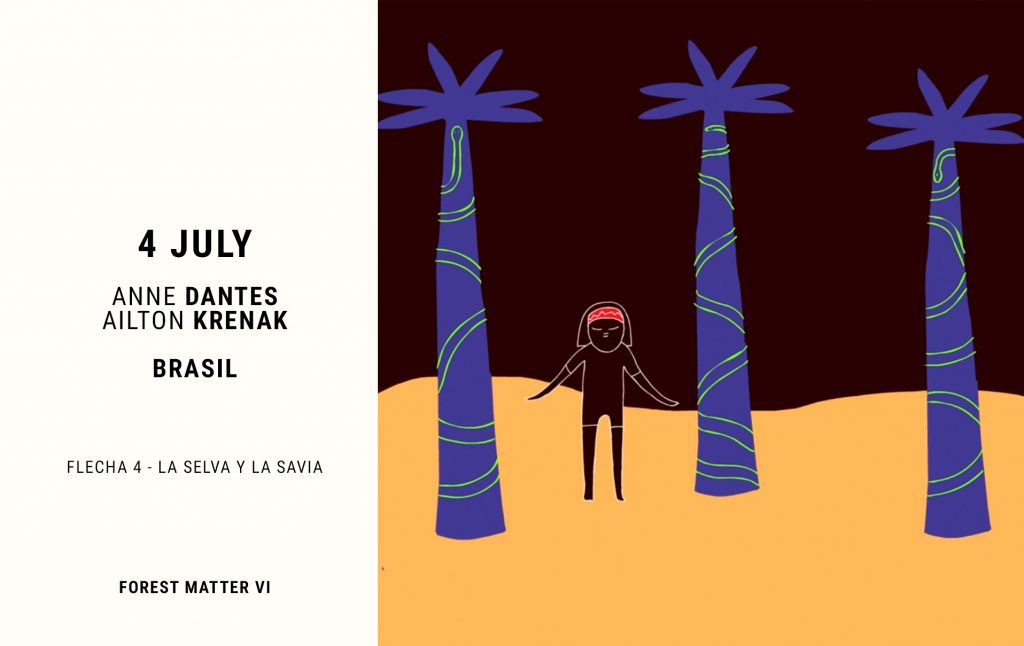
FOREST MATTER VI · La flecha y la salvia (2021) · Anna Dantes & Ailton Krenak, Brazil · 08:22 min
“La flecha y la salvia” (The Arrow and the Sage) discusses the master plants that open the cosmic reality of life and their power of vision and healing. It is the fourth instalment of the series of seven chapters “Flecha Salvaje” (Wild Arrow), narrated by the Brazilian philosopher Ailton Krenak and produced by Selvagem, with the advice of Huni Kuin Dua Buse and Cristine Takuá from the cycle of studies on life.
The artists Alexandre Vogler, Camilla Coutinho, Gerald McDermott, Josies Manà Kaxinawa, Tadeu Siã Kaxinawa, Rember Yahuarcani, Maria Klabin, Taua Klonowski, Chonon Bensho, Lastenia Canayo, Karl Blosuk Soria (Shimpuarte), participate in the “image composting”. Jeffrey Ventrella, Sérgio Bernardes Filho, Elisa Mendes, Tatulí Macário Kaxinawá Ixã, Edi Yaka and Isaka Huni Kuin and Thiago Carvalho Wera’i.
Artistic direction, script and research: Anna Dantes. Direction and narration: Ailton Krenak. Consulting: Dua Buse and Cristine Takua. Narration: Cris Takua, Dea Trancoso and Mateus Aleluia. Production: Madeleine Deschamps. Edition: Elisa Mendes. Animations: Livia Llama. Soundtrack: Lucas Santatana and Gil Monte. Production assistants: Victòria Moawad and Laís Furtado. Special support: Domitille Camus and the IPÊ – Institute of Ecological Research.
Thursday, July 4, 2024 · Lecture · Pati de l'Hospici · Olot · 19h
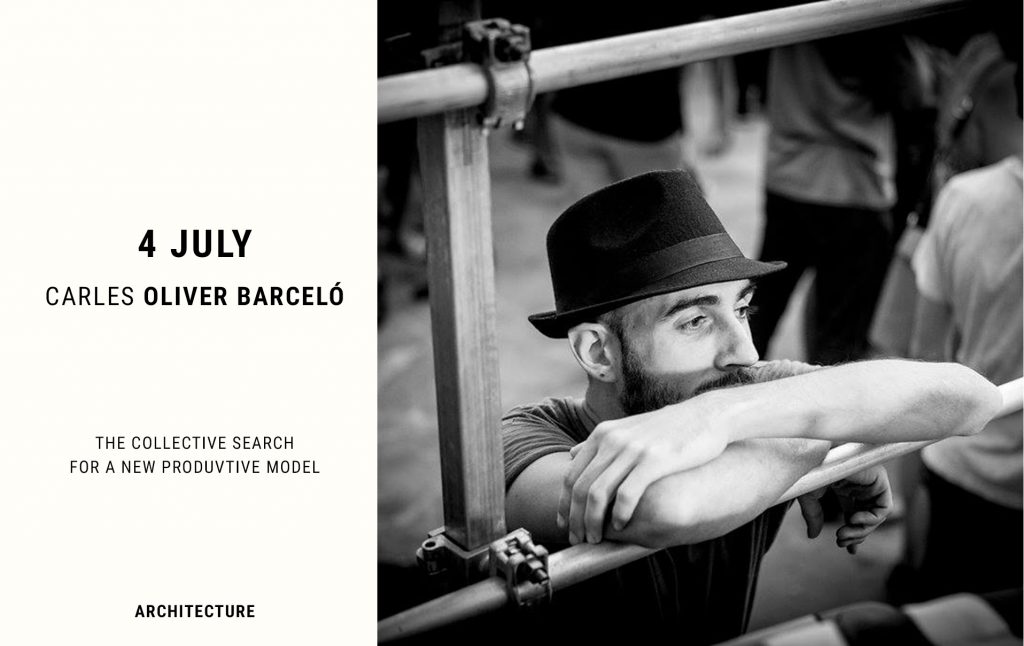
ARCHITECTURE · The Collective Search for a New Productive Model · Carles Oliver Barceló
Presented by Jordi Moret i Vayreda, delegate of the Garrotxa-Ripollès of the Architects’ Association of Catalonia
According to the UN, current policies are not conducive to curbing climate change and its effects, such as extreme heat waves, drought, and rising sea levels. Reversing this situation is not a task for a few, but a collective responsibility that requires a shift in production and consumption patterns in all areas.
In architecture, a series of examples have been developed in the Balearic Islands that not only configure a possible production model but also ignite a beacon of hope. This model considers and reduces the externalities it generates, offering a promising path forward. The sum of these proposals constitutes a language that is not based on a question of style or form but on the incorporation of environmental and social priorities, where the recovery of cultural heritage becomes a tool both to comply with the objectives of decarbonisation and to recover the notion of the city as the sum of anonymous and silent interventions, where self-sufficiency in construction processes blurs the boundary between the productive space of the city and the productive space outside the city.
Carles Biel Oliver Barceló (Felanitx, Balearic Islands, Spain, 1979) is an architect from the Barcelona School of Architecture (ETSAB – UPC) and a master of works by professional necessity. During his studies, he received scholarships to study at UC Los Angeles, TU Delft and the Madrid School of Architecture (ETSAM-UPM). From 2007 to 2009, he shared a studio with Francisco Cifuentes, from whom he learned to project from construction. Since 2009, he has been a member of the Balearic Housing Institute (IBAVI), where he directed the climate change adaptation project ‘Life Reusing Posidonia’ in Formentera, which received the LIFE 2021 award for the best project of the environment from the European Commission. From 2019 to 2023, he was responsible for the Technical Department of the IBAVI. He has been co-author of other pilot housing projects such as the 5, 8 and 19 public protection housing (HPP) in Palma, or 6 HPP in Santa Eugènia, of the UAC2 eco-neighbourhood, and rehabilitation works such as Sant Miquel 19, or Can Lliro. The projects developed both at a private level and as part of the IBAVI team have received some awards that facilitate raising credibility. This work has been widely published and exhibited.
Tuesday, July 9, 2024 · Forest Matter VI · Pati de l'Hospici · Olot · 19h
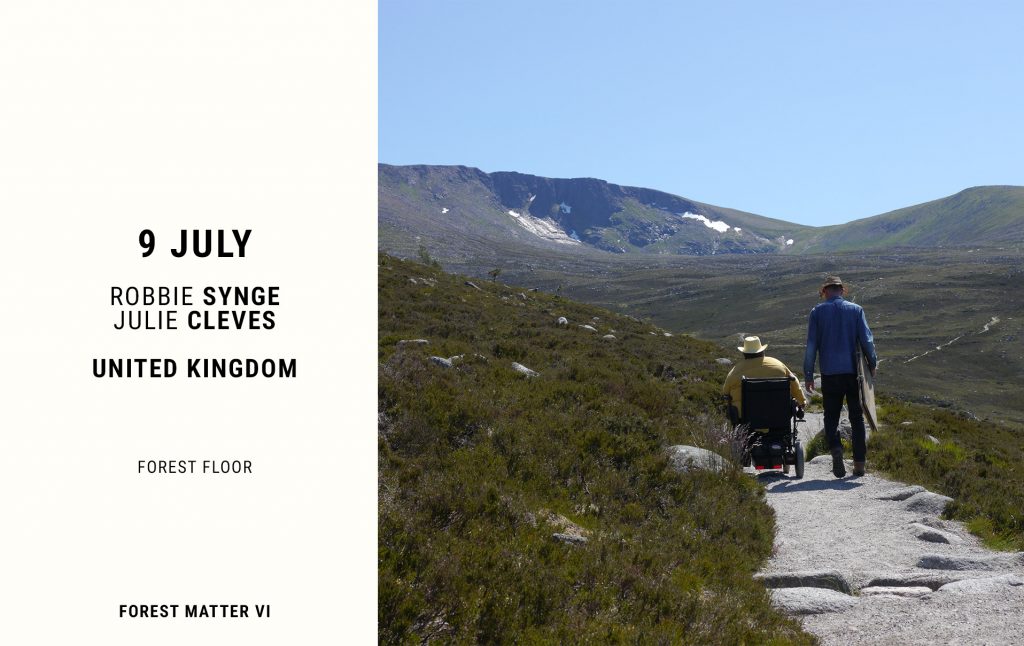
FOREST MATTER VI · Forest Floor (2020) · Robbie Synge & Julie Cleves, United Kingdom· 04:45 min
In Abernethy Forest, artists and friends Julie and Robbie playfully investigate collaborative solutions to the problems of access to nature faced by people with physical disabilities.
Director and Editor: Robbie Synge; Performers: Julie Cleves & Robbie Synge; Chamber: Emma Dove; Sound recording: Jonathon Mccloone; Color: Beth Woodruff; Photography: Scott Green; Special Thanks: Susan Christie. This work was commissioned by LUX Scotland and the BBC as part of the Now & Next initiative.
Tuesday, July 9, 2024 · Lecture · Pati de l'Hospici · Olot · 19h
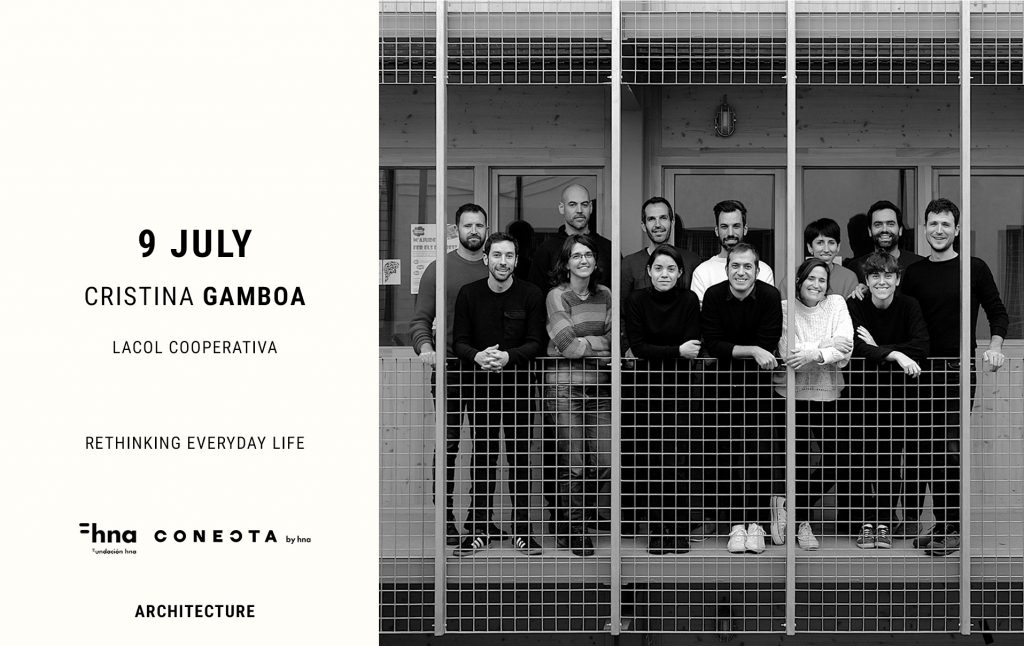
ARCHITECTURE · Reevaluate the Ordinary · Cristina Gamboa · Lacol Arquitectura cooperativa
Presented by Guillem Costa Calsamiglia, dean of the Architects’ Association of Catalonia
The hna FOUNDATION supports this conference and is a beneficiary of the CONECTA by hna program.
Everyday life encompasses the commonplace, the daily, and the ordinary. The potential for transformation inherent in everyday practices serves as a foundation for envisioning alternative ways of organizing and relating to one another, as well as constructing and experiencing architecture amid a systemic crisis, whether social, environmental, or economic.
Lacol is a cooperative of architects established in 2009 in the Sants neighbourhood of Barcelona. Through architecture, cooperatives, and participation, they work to generate community infrastructures for the sustainability of life, which is a critical tool for eco-social transition.
At Lacol, they believe that the city’s transformation is best achieved through the active participation of its inhabitants and proactive action. They work on issues that directly impact the quality of life of all city residents. Architects play a crucial role in the urban movement, helping to translate citizens’ concerns into concrete objectives and strategies and providing tools to communicate ideas through graphic design.
They encourage, among other things, debate and discussion on the uses of spaces and the management of urban areas, city models, participation, and the recovery of heritage.
Wednesday, July 10, 2024 · Forest Matter VI · Pati de l'Hospici · Olot · 19h
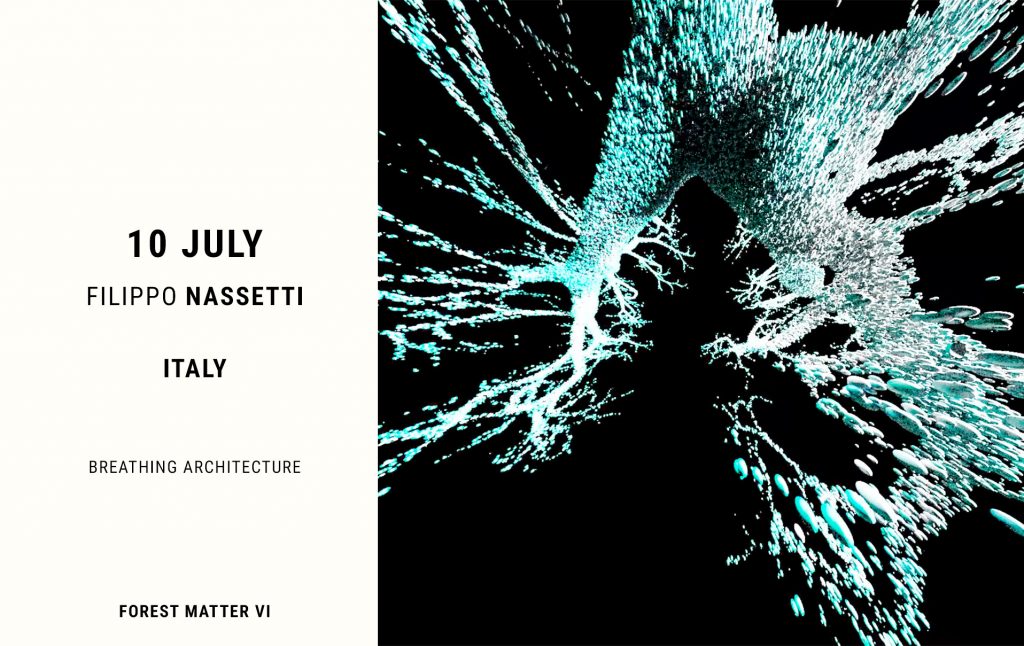
FOREST MATTER VI · Breathing Architecture (2024) · Filippo Nassetti, Italy · 03:30 min
This video has the support of the European Commission and is a beneficiary of the S+T+ARTS AIR program.
Breathing Architecture focuses on the respiratory system and collaboratively experiments with models, numerical simulations, and visualization techniques created through High-Performance Computing. By carefully selecting and structuring information, beauty becomes functional, enabling interpretation, recall, and connection.
Artist: Filippo Nassetti. Scientific mentors: Beatriz Eguzkitza (BSC), Silvia Ceccacci (BSC), Jerónimo Calderón (BSC), Guillermo Marín (BSC), Uwe Wössner (HLRS), Leyla Kern (HLRS) and Susanne Malheiros (HLRS); Artistic Tutors: Pep Gatell (EPICA), Fco. Javier Iglesias Gracia (EPICA). Artistic innovation: Rodolfo Groenewoud van Vliet (IN4ART), Lija Groenewoud van Vliet (IN4ART). Communication: Darja Oražem (PINA), Taja Kavčič (PINA)
Wednesday, July 10, 2024 · Lecture · Pati de l'Hospici · Olot · 19h
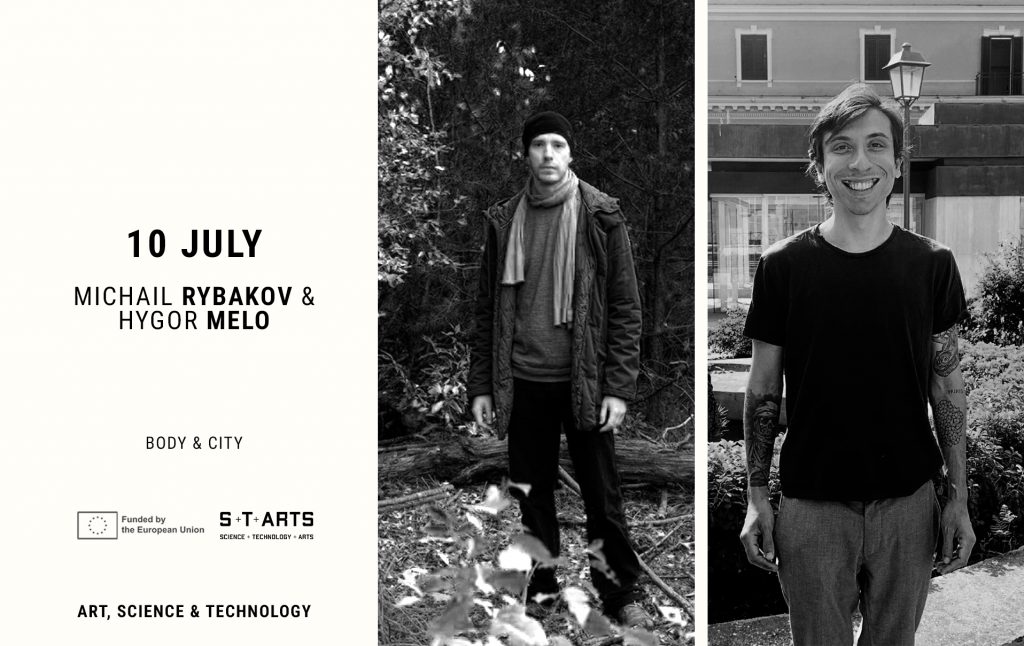
ART, SCIENCE AND TECHNOLOGY · The Body and the City · Michail Rybakov & Hygor Melo
Presented by Carme Pigem, founder of RCR Arquitectes and advisor of the European project S+T+ARTS Air
This video has the support of the European Commission and is a beneficiary of the S+T+ARTS AIR program.
This conference features a dialogue between multimedia artist Michail Rybakov and Hygor Melo, a researcher specializing in computational physics and complex systems from Sony Computer Science Laboratories in Rome (Sony CSL). They explore how our cities, the very spaces we inhabit, influence our personal space and experiences.
S+T+ARTS AIR is a project that harnesses the power of art, science and technology to address our society’s urgent challenges.
The European Commission recognizes the vital role of cultural and creative industries in improving Europe’s competitiveness and driving innovation. The urgent need for integrating art, science, and technology is crucial. This approach can unlock the cultural sector’s transformative potential, stimulating critical thinking and offering new perspectives on our society’s future in the face of technological advances and environmental impacts.
Michail Rybakov (Leningrad, USSR, 1984) is a media artist who explores the interaction between the body and technology in everyday life. He studied multimedia art at the State University of Art and Design in Karlsruhe. During his two years of postgraduate research on the topic “Strategies of Arrival at Space,” he had the philosopher of science and anthropologist Bruno Latour as a mentor.
Hygor Piaget Monteiro Melo is a researcher specializing in computational physics and complex systems. His work is centered on the science of cities and collective human behavior. With a PhD in Condensed Matter Physics from the Federal University of Ceará in Brazil (2016), he currently holds position as an associate researcher at the Sony Computer Science Laboratories in Rome. Hygor’s use of physics and mathematics tools has provided valuable insights into urban dynamics and human interactions.
Thursday, July 11, 2024 · Forest Matter · Pati de l'Hospici · Olot · 19h
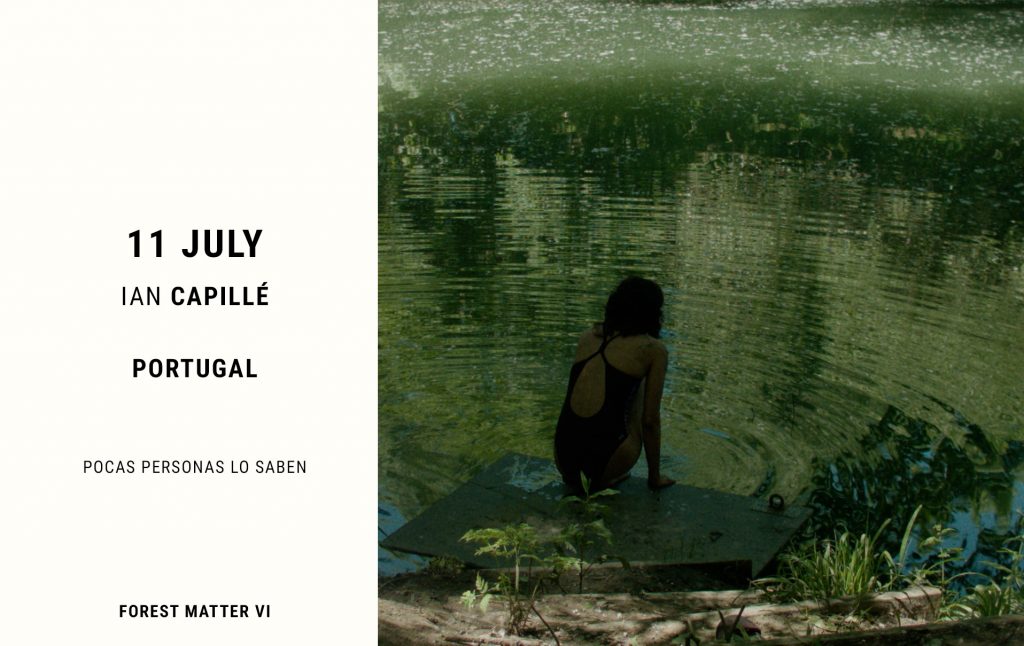
FOREST MATTER VI · Pocas personas lo saben (2024) · Ian Capillé, Portugal · 11:45 min
Created during the artistic residency at the Arbola Festival 2024 with the support of LABEA and RCR Bunka Foundation.
The intimate relationship between sunlight and tree leaves has a photographic quality: leaves look green because they reflect the green spectrum of light since they are not used in the photosynthesis process of plants. What stories does this light tell?
Address, photography and editing: Ian Capillé. Interpretation: Arantxa Ciafrino and So Dias. Music: Ill Memorize Every Line, original music by Breno Góes. Acknowledgements: Isabel Ferreira, Eduardo Bonito, Adriana Reyes, Catarina Saraiva, Claire Hurley, Ghislaine Estiu, Maitane Azpiroz, Marc Ranieri, Monika Aranda, Joana Costa Santos and Nina Botkay.
Thursday, July 11, 2024 · Lecture · Pati de l'Hospici · Olot · 19h
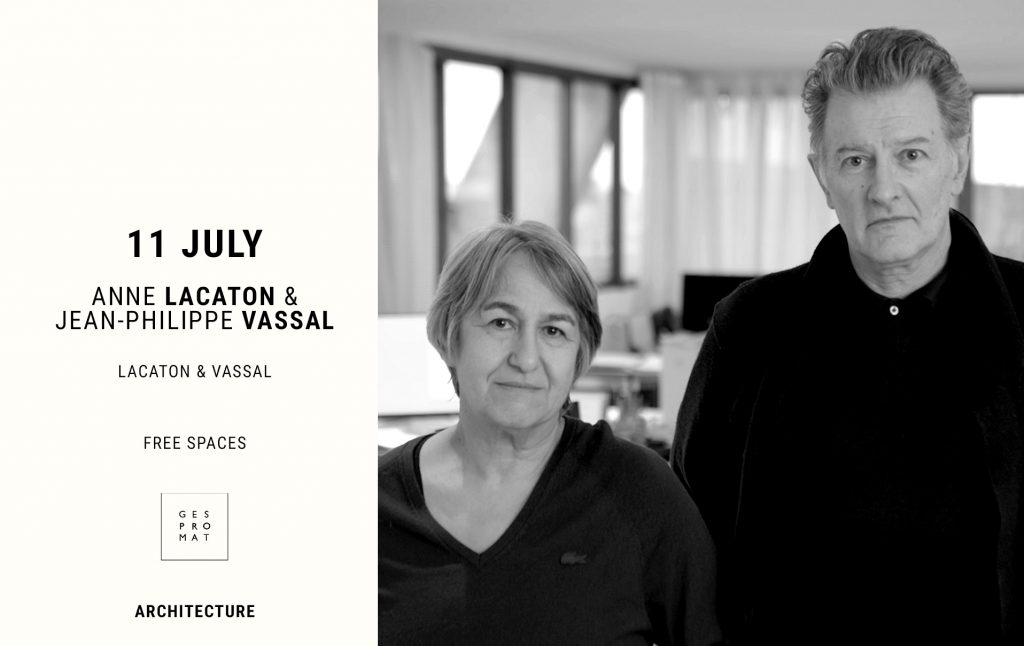
ARCHITECTURE · Free Space · Anne Lacaton and Jean-Philippe Vassal · Lacaton & Vassal
Presented by Llàtzer Moix, cultural journalist and architecture critic.
This conference is supported by Cercle Gespromat.
Architecture is freedom, generosity, and pleasure. Large spaces generate a feeling of freedom and facilitate appropriation, favour relationships within the spaces, allow pleasurable situations, foster relationships between people, and promote social life. Expanding doesn’t mean wasting. It means inventing spaces for use and going beyond the rules and standards that reduce living space. This applies to both new projects and the transformation of existing sites. The transformation of what already exists always offers the opportunity to do more with less. Transforming the existing is generous, practical, and ecological, and it’s a key part of sustainable architecture.
Anne Lacaton (Saint-Pardoux-la-Rivière, France, 1955) graduated from the Bordeaux School of Architecture in 1980. She then earned a degree in Urban Planning from the University of Bordeaux in 1984. Since 2017, she has been a professor at ETH Zurich. Lacaton has also served as a guest professor in various institutions. She has been a guest at the Madrid School of Architecture (ETSAM-UPM) for the Master in Housing program since 2007; at EPFL Lausanne in 2004, 2006, 2010-11, and 2017; at the University of Florida in Ivan Smith’s studio in 2012; at the University of New York at Buffalo as the Clarkson Chair in 2013; and at the Pavillon Neuflize OBC-Palais de Tokyo in Paris in 2013 and 2014. Additionally, she has taught at Harvard GSD, serving as a Kenzo Tange professor in 2011 and as a Design Critic in 2015. She also taught at the University of Sassari in Alghero in 2014 and 2015 and at TU Delft during the 2016-17 academic year.
Jean-Philippe Vassal (Casablanca, Morocco, 1954) graduated from the Bordeaux School of Architecture in 1980. He worked as an urban planner in Niger (West Africa) from 1980 to 1985. Professor at the UDK in Berlin since 2012. Visiting professor at TU Berlin from 2007 to 2011; Jean-Philippe Vassal (Casablanca, Morocco, 1954) graduated from the Bordeaux School of Architecture in 1980. He worked as an urban planner in Niger (West Africa) from 1980 to 1985. His global perspective is further enriched by his roles as a professor at the UDK in Berlin since 2012, and as a visiting professor at various institutions across Europe, at the Peter Behrens School of Architecture in Düsseldorf in 2005; at EPFL Lausanne from 2010 to 2011; at Pavillon Neuflize OBC-Palais de Tokyo, Paris, in 2013 and 2014; at the University of Sassari in Alghero in 2014 and 2015.
Lacaton & Vassal, the renowned architectural practice, has received several prestigious awards, including the Pritzker Architecture Prize 2021 and the Lifetime Achievement Award at the Lisbon Triennial in 2016. In 2019, they shared the Mies van der Rohe Foundation’s European Union Contemporary Architecture Award with Frédéric Druot Architecture and Christophe Hutin Architecture for their transformation of 530 Housing in the Grand Parc, Bordeaux.
